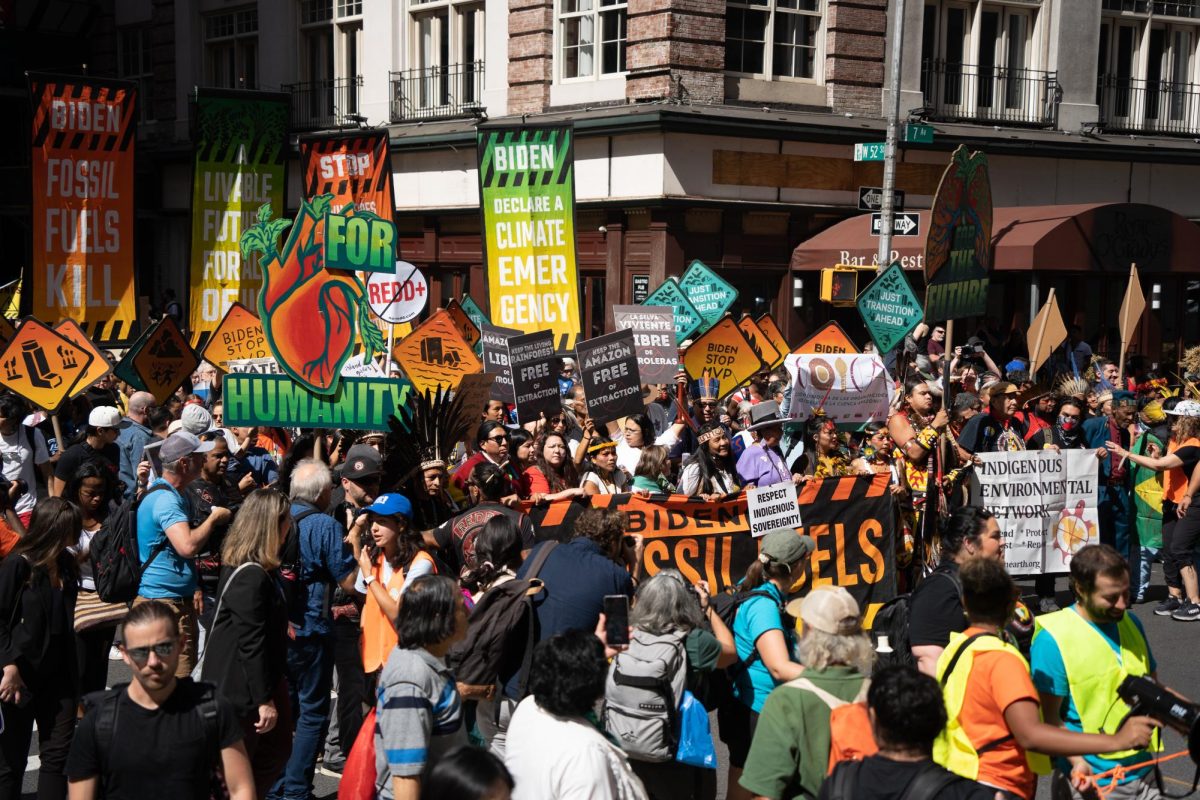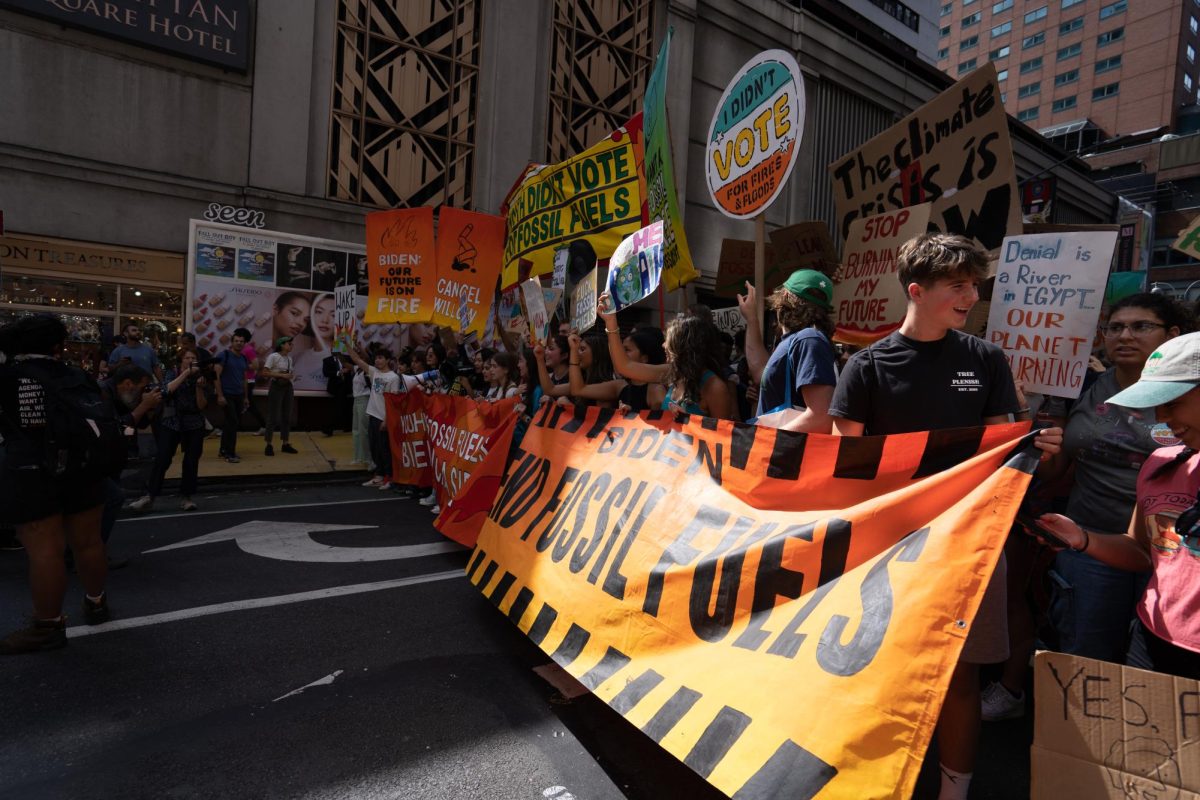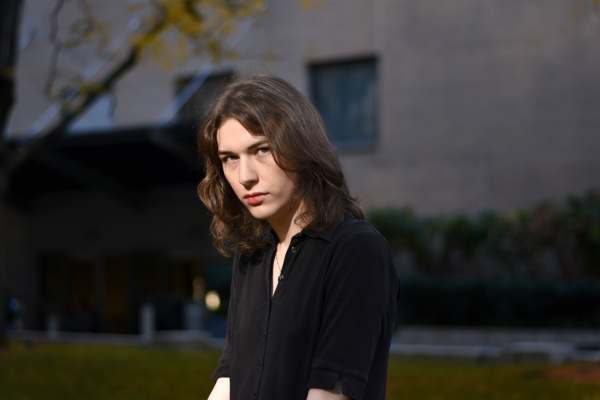Tens of thousands of protesters from across the country, including dozens of Fordham students, marched in the heart of Manhattan on Sept. 17 to demand an end to the use of fossil fuels in a collaborative action organized by grassroots organizations in New York City.
The protest, one of 650 actions organized throughout 60 countries by the Global Fight to End Fossil Fuels campaign, took place ahead of the U.N. Climate Ambition Summit held that week, which U.S. President Joe Biden did not attend. Protestors took specific aim at Biden, who promised in 2020 to phase out fossil fuels if elected president.
The march took place one block away from Fordham Lincoln Center, where attendees rallied at Columbus Circle at the end of what climate scientists have called the hottest summer on record. This year, Americans faced accelerating changes to the climate as severe heat waves scorched U.S. states in the south, during which hospitals treated patients suffering from heat stroke and burns from asphalt and wildfires in Canada choked New York City with smoke.
According to the March to End Fossil Fuels coalition, an estimate of over 75,000 people took part in the protest, which was endorsed by hundreds of environmental advocacy groups. Fordham students marched alongside protesters of all ages, representing a broad range of worldviews and experiences, and demanded that Biden take decisive action to curb greenhouse gas emissions.
“I am here because our generation is going to be most impacted by the decisions that are made about fossil fuels,” Sejal Getchell, Fordham College at Rose Hill (FCRH) ’25, said. “Not enough action is being taken.”
Getchell noted that members of Fordham faculty encouraged her to march, including Christopher GoGwilt, professor of English at Fordham Rose Hill. GoGwilt explained how the study and practice of the humanities are vital to addressing the unprecedented and dire challenges posed by climate change.
“How do you articulate the fact that the real criminals are not climate activists but the companies and the governments that are not addressing the concerns of the climate crisis?” he asked. “This is an issue that is both deeply academic: All of the disciplines encounter the question of our climate emergency, and yet it is an issue that we encounter outside of the classroom.”
Some students joined the protest because of their involvement in environmentalist organizations on campus, such as Stizzy Demacopoulos, FCRH ’24 and a leader at Fordham Students for Environmental Awareness and Justice (SEAJ). SEAJ is a community activist group that organizes volunteer cleanups in Manhattan and the Bronx and advocates for the advancement of climate friendly policies, such as divestment from fossil fuels.
“It feels like there is not much we can do against the system, but we can do this,” Demacopoulos said.
Environmentalist organizations, such as the Sunrise Movement, Extinction Rebellion and the Sierra Club, held rallies ahead of the march, raising banners and loudspeakers in support of each group’s mission.
Hannah Birnbaum, the Northeast Regional Director of the Sierra Club, noted that the transition from fossil fuels to renewable energy is everyone’s responsibility.
“The burden is on all of us to figure out how we make this transition in a way that is just, in a way that protects workers, in a way that protects low income people and vulnerable people,” Birnbaum said.
In her role at the Sierra Club, Birnbaum noted that she coordinates a broad range of efforts ranging from protests against pipeline expansion to lobbying for local legislation, which would electrify New York City’s municipal vehicles.
While there are many steps people can take to reduce their individual carbon footprint, Nick McIntosh, FCRH ’28 and a doctoral philosophy student and instructor, explained how the massive scale of climate change and the deep roots of fossil fuels in the world economy can make many people feel helpless about stopping climate change.
McIntosh, who teaches environmental ethics, said that the purpose of ethics is to help people reckon with a changing climate in a way that empowers them to take action.
“Things like despair are not generally things that make you want to act, seeing opportunity and possibility do,” McIntosh said.
He added that activists could narrow their efforts to effect change in their local communities, where they are more likely to make an impact. For example, McIntosh suggested Fordham students should scrutinize the university’s endowment for possible investments in fossil fuel companies.
“This is true of any business or organization: where the money is will tell you more than any amount of rhetoric,” he said.
New York University (NYU) became the latest high-profile institution to divest its endowment from companies whose primary business is the exploration or extraction of fossil fuels in August. NYU’s board of trustees reaffirmed their intent to continue to divest from any companies indirectly related to the exploitation of fossil fuels in a letter published on Sept. 18 addressed to the university’s Sunrise Movement group.
Fordham’s Laudato Si’ Action Platform, named after Pope Francis’s 2021 encyclical, included a commitment to undertake a study of Fordham’s $1 billion endowment for exposure to fossil fuels. Some students and faculty, however, believe that Fordham’s Office of Investment — which is responsible for managing the university’s endowment — should be more transparent regarding the progress of this study.
“(SEAJ) wants more transparency with what our endowment is in,” Demacopoulos said. “We want to make sure that the money that is divested is reinvested into sustainable practices.”
The Office of Investment and Bob Howe, associate vice president for communications and special adviser to University President Tania Tetlow, declined to comment.



